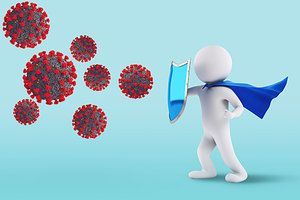The most important relationship I seek to nurture in the treatment room is the one a patient has with their own body. We live in a culture that teaches us to override pain, defer to outside authority, and push through discomfort. Patients often arrive hoping I can “fix” them, but the truth is, we can’t do the work for them. We can offer guidance, insight and support, but healing requires their full participation.
Investing in Immunity: Key Formulas
"We may try and do whatever we want with Qi, but if you are not following heaven or the natural order of life within you in some way, you will not succeed in maintaining either your life or your health."
— Elisabeth Rochat De La Valee, A Study of Qi
One of the most common questions I hear from patients on a daily basis is, "How do I improve my immunity?" This is a complex question that is not easy to answer in a generic, standardized fashion. An axiom within traditional Chinese medicine is "treat the patient not the disease" and targeting the therapies toward resolving unique patterns of disharmony within the patient is the road toward this individualized goal. This resolution of unique patterns of disharmony involves many physiological and psychological processes which are no doubt involved in improving an immune response in our patients.
From the perspective of traditional Chinese medicine, when the qi and blood are flowing unencumbered, spleen qi is strong, blood is nourished, and the kidneys are banked, the nebulous idea of "immunity" is functioning smoothly in the patient's unique body.
The Limitations of Yu Ping Feng San

One of the most common patent medicines I see practitioners recommend for boosting immunity in patients is Yu Ping Feng San. This formula replenishes qi, tonifies wei qi, consolidates the exterior and stops sweating. While I do use this formula extensively in the clinic, I feel it has some significant limitations in patients who are truly expressing deficiency symptoms of qi and blood. The majority of patients I encounter possess both qi and blood deficiency, and Yu Ping Feng San alone will not resolve this more complex pattern.
A Better Choice: Dang Gui Bu Xue Tang
In such cases, I use the patent medicine or decoction Dang Gui Bu Xue Tang. This formula tonifies qi, nourishes blood, consolidates the exterior, and harmonizes yin / yang. An elegantly simple formula consisting of just Huang Qi and Dang Gui, Dang Gui Bu Xue Tang is vitally important for patients who present with a combination of qi and blood deficiency (which as I stated, Yu Ping Feng San does not effectively address in my experience).
Combine the Two Formulas?
In cases of significant qi and blood deficiency, Dang Gui Bu Xue Tang and Yu Ping Feng San can be combined in either decoction / extract form or patent medicines. However, when patients present with significant qi and blood deficiency, often more complex formulas are needed.
Ren Shen Yang Rong Tang
In such cases, I use the patent medicine Ren Shen Yang Rong Tang. This formula / patent medicine tonifies qi, nourishes and invigorates blood, nourishes yin, warms yang, benefits the spleen, heart and lungs, and calms the shen. This is an extremely comprehensive patent medicine / formula that deeply nourishes all aspects of a patient's health and vitality.
I personally feel Ren Shen Yang Rang Tang is one of the most important and underused patent medicines / formulas in helping patients boost their health and vitality. Instead of pushing questionable trendy "superfoods," clinicians should refamiliarize themselves with this important formula and its comprehensive actions.
Other Important Formula Combinations
In patients who present with qi and blood deficiency with concomitant kidney yin / yang deficiency, I use the patent medicine Wu Zi Yan Zong Wan in combination with Dang Gui Bu Xue Tang. Wu Zi Yan Zong Wan warms kidney yang, tonifies blood, nourishes yin and consolidates jing. A deeply nourishing formula / patent medicine, Wu Zi Yan Zong Wan can also be used in combination with the ever-popular patent medicine Xiao Yao Wan in cases of qi / blood deficiency, kidney deficiency and liver depression qi stagnation. This complex pattern is a very common occurrence in the clinic, and resolving these patterns of disharmony allow the patient's immune response to function efficiently.
I personally find Wu Zi Yan Zong Wan to be more clinically relevant than the traditional yin-supplementing formula Liu Wei Di Huang Wan. However, there is no clear-cut need to only use one of these two yin-supplementing formulas. You can easily combine the two formulas.
In most cases, I combine Wu Zi Yan Zong Wan with Ren Shen Yang Rang Tang to deeply and comprehensively target a complex array of pattern disharmonies involved with the concept of immunity.
If a patient presents with qi / blood deficiency, kidney deficiency and significant liver depression qi stagnation, combining Ren Shen Yang Rang Tang with Yi Guan Jian can be used to effectively target all aspects of this complex pattern combination. Yi Guan Jian nourishes liver yin and blood, soothes the liver qi, moistens the tendons, and supports kidney yin.
Time-Proven Medicine
I hope this short discussion inspires you to avoid the endless search for "immunity superfoods" and instead focus on the time-proven medicines used within TCM. Harmonizing the patient's qi and blood, and teaching the patient the importance of sleep hygiene and its relationship to immunity, are vitally important prescriptions for investing in long-term health, immune resilience and vitality. No amount of miracle cures or "superfoods" can replace the tools we have at our disposal.



